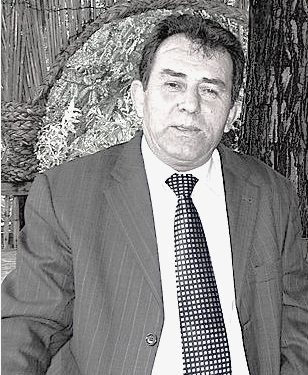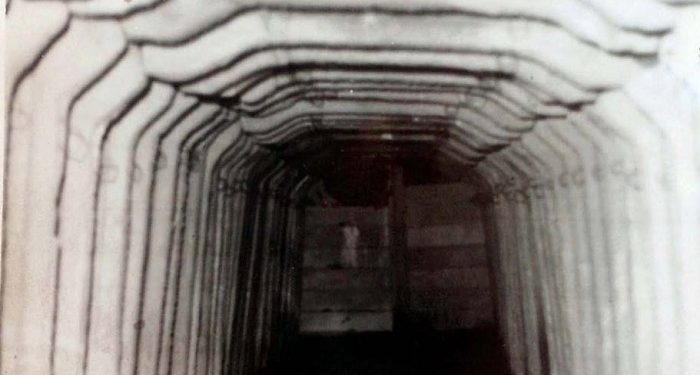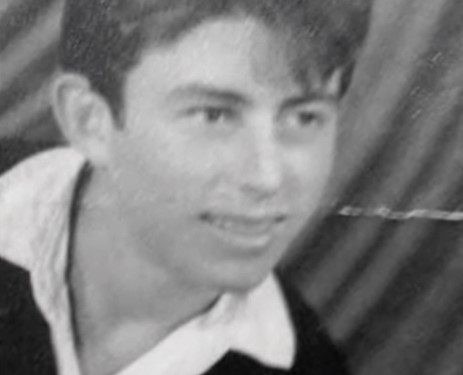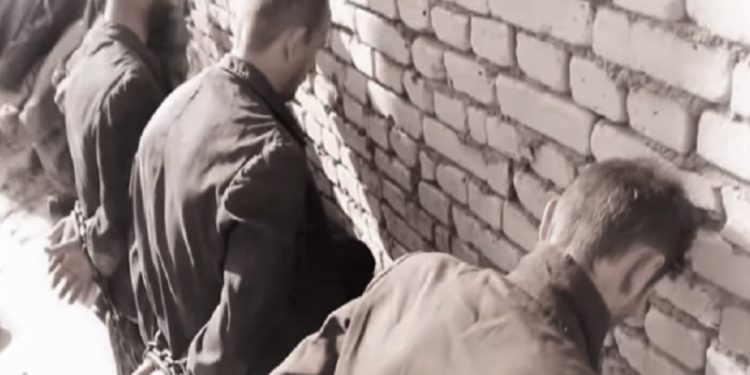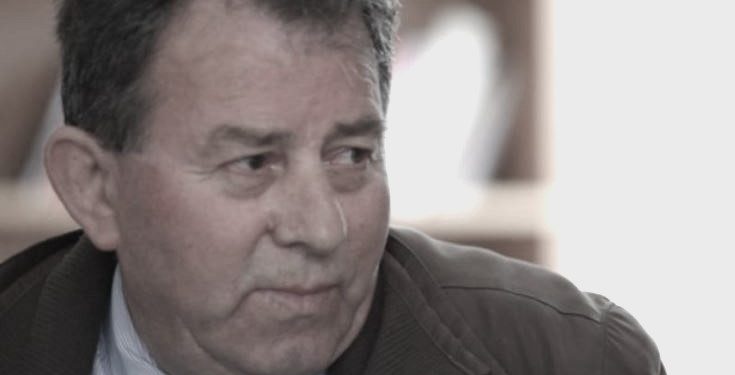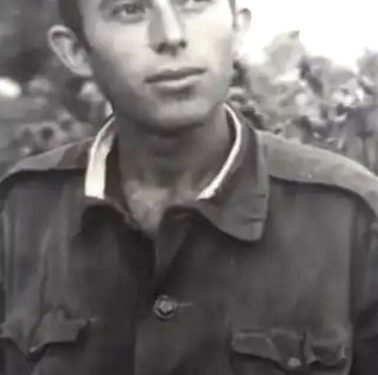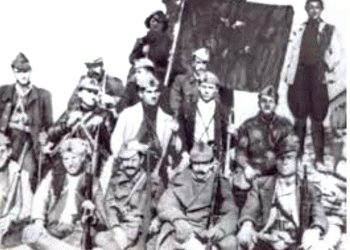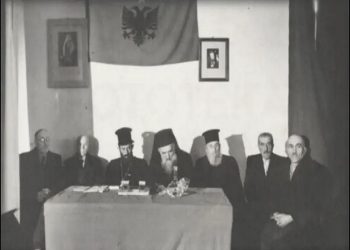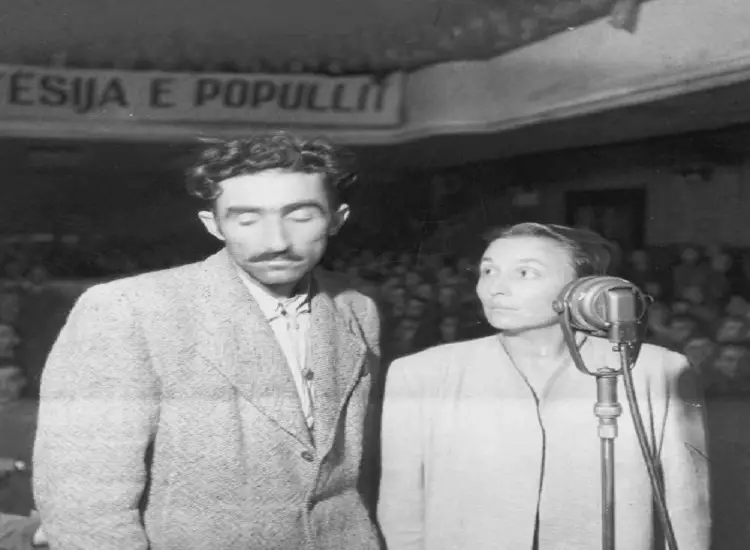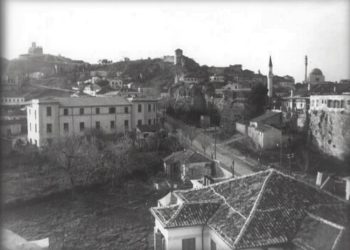By Shkëlqim Abazi
Part fifty-eight
Memorie.al / I were born on 12. 23. 1951, in the black month, of the time of mourning, under the blackest communist regime. On September 23, 1968, the sadistic chief investigator, Llambi Gegeni, the ignorant investigator, Shyqyri Çoku, and the cruel prosecutor, Thoma Tutulani, mutilated me at the Branch of Internal Affairs in Shkodër, split my head open, blinded one of my eyes, deafened one of my ears, after they had broken several ribs, half of my molars, and the thumb of my left hand. On October 23, 1968, they brought me to court, where the wretch Faik Minarolli gave me a ten-year sentence for political imprisonment. After half of my sentence was cut, because I was still a minor, sixteen years old, on November 23, 1968, they took me to the political camp of Reps and from there, on September 23, 1970, to the Spaç camp, where on May 23, 1973, during the revolt of political prisoners, four martyrs were sentenced to death and executed by firing squad: Pal Zefi, Skënder Daja, Hajri Pashaj, and Dervish Bejko.
On June 23, 2013, the Democratic Party lost the elections, a process more than normal in the democracy we aspire to. But on October 23, 2013, the Director-General of the “Rilindas” (Rebirth) Government sent Order No. 2203, dated 10.23.2013, for: The dismissal of a police employee. Thus, Divine Providence intertwined with the Neo-communist “Rilindas” Providence, and precisely on the 23rd, I was replaced, no less and no more, by the former Operative of the Burrel Prison Sigurimi (Secret Police). Could there be anything more meaningful than that?! The former political prisoner is replaced by the former persecutor!
The Author
SHKËLQIM ABAZI
Continued from the previous issue
R E P S I
(The Forced Labor Camp)
Memoir
The First Meeting
(The boat drowned in the cistern)
With Karafil from Devolli, they shared not only the name and the accusation, but also the end. That is, the inevitable death in prison, due to a sentence beyond the limits of their physical age. Karafil Laholli from Bozhigrad was about eighty-two years old when he was sentenced. On a cold late-winter day in 1970, he was brought to Reps, to the “Corrugated Iron Barrack.”
He was a stocky old man of medium build, who did not look his real age. He had a round face with chubby cheeks, and was always cheerful; the tips of his twisted mustache tickled his ears. A pair of broad eyebrows rested above his bright, ash-colored eyes, like the wings of a bird in flight.
Since our bunks were close, we became friends over the months. I performed some small services for him, such as: when I went to the fountain for water, I would fill his water jug too; when I went to the cauldron for food, I would take his ration as well; in the evening, I would warm up a bucket of water for him to soak his feet, because as an old man, he suffered from rheumatism, and despite his best efforts, he struggled to walk.
These small acts of service, which were not a great effort for me, gave the old man pleasure. Especially when I brought his coffee warm to his bed, he would boast, feeling as if he were home with his old woman; he would caress his large mustache with his thick fingers, raise his bushy eyebrows, and say to me; “May you be blessed, son,” with all his heart.
This was repeated almost every day, so much so that, once, Refat Arixhiu jokingly said to him: – “Uncle Karafil, you’ve filled our sacks with so many blessings that anyone who goes into the depot for clothes finds blessings instead. Man, you’re leaving the people naked!” – “Ah, you Refugee Refat, that’s your nature, you were born by the river, not this boy!” – The witty old man retorted in the same language.
He was an attentive conversationalist, quick-witted, and pleasant, but when the conversation turned to his sentence, he dodged the answer. Because I had bothered him many times with the same question, one day he retorted: – “Hey, what about the others who are here, what were they sentenced for? For nothing, man, for nothing! They put me in here for nothing too, for… shit, man!” I fell silent, I didn’t push it further. “Leave it, he is old and doesn’t know what he’s saying! Maybe he’s a little off his mind!” After that, we didn’t open the topic again.
But one day, Namik Hoxha, a fellow villager of his, came to visit him at his bed. Since Uncle Karafil was used to my services, he told me to make coffee for them. So, I did. I went to the private kitchen, brewed the coffee in a navy kettle, because we didn’t have a proper coffee pot, and brought it to them hot. When I was about to leave for my bunk, they invited me to sit down. During the conversation, the topic of the old man’s family came up. There, I learned that he lived only with his old woman. The son he had had fled to Greece, long ago.
The old man recounted to Namik the new things that had happened in the village during the eight years he had been languishing in prison. He told him about those who had died, those who had married, those who had become communists, and those who had fled. As fellow villagers, they mentioned people by name, as they all knew them, but they didn’t draw my attention, as they held no interest for me.
However, when the talk turned to the old man’s sentence, I instantly became all eyes and ears and focused on the conversation. He recounted how the Chairman of the Unified Council and the village’s party secretary had set a trap for him.
At that moment, he took a many-folded letter from his vest pocket and handed it to me: – “Here, my boy, read it! Since you are still curious, look, and be convinced that they put me in here for… the shit! I felt ashamed of what I was hearing in Namik’s presence, nevertheless, I took the folded sheet, opened it carefully, lest I tear it; it was almost stuck together like a cigarette paper. I gave it a quick look. I saw the word “shit” repeated many times. Around the middle of the sheet, there was also a poetic stanza. Curious about what was written, I slowly returned to the beginning. Below I reproduce, as much as I remember, what was ingrained in my mind from the text of this ridiculous accusation.
It began with personal data, unimportant to mention, such as: date of birth, place of birth, residence, and other things, things known to anyone who has gone through the Sigurimi investigation. Then the specific accusation followed:
“The defendant Karafil Laholli, on the consistent path of treason, as a sworn enemy of the Party and our freedom-loving people, has spared no means to realize his wicked goals. He has abused the boundless freedom guaranteed by our democratic and popular constitution. He has openly conducted propaganda against the Party and the government, has continuously insulted the cadres of the agricultural cooperative, has tarnished the image of women and youth with the mark of shame, has mockingly dismissed the revolutionary spirit that has encompassed the broad masses, who have launched an assault for the construction of the new Albania, and in particular, has denigrated the morale of the volunteers of the Rrogozhinë-Lushnjë railway.
The slogans spread by him that, supposedly, our heroic youth is being sent to actions to be degenerated, have severely indignant his fellow villagers. To one of them, he is said to have explicitly stated these words: ‘Now the cooperative foremen are no longer looking for workers, but are seeking new breeding stock, to improve our race! They are sending our girls to youth actions, so they can return pregnant! Don’t send your daughter, or may your mind be clouded!’
The defendant Karafil, as an enemy and the father of an enemy, through his son who fled, is wholly in the service of the Greek Asfalia (Security Service), maintains permanent contact with the counter-espionage of the monarcho-fascists. From confidential sources, it results that spies and saboteurs have supplied him with aid in food, clothing, and money. Because, how else can it be explained that he can afford that luxurious life, which the defendant lives, when he is not given anything in the village shops, because neither he nor his old woman agree to work in the brigade? Let the defendant answer us: Where do you find the money that you spend every week in the Korçë market, loading the donkey with food and clothes?! I don’t think it takes much thought! The answer to this question is self-evident: the drachmas and dollars paid to him by the monarchists for the services he performs for them. Thus, it results: the defendant Karafil is utterly entangled with Western secret services, despite denying it and trying to cover it up. Who has ever seen an enemy say: I am the enemy?! No, no, it has neither been seen nor heard. Because they are sworn to the path of betrayal.
But our Party and our enlightened Leader, tested in so many confrontations, have torn and will tear off their mask, will definitively expose and dismantle them. Let us return to the activity of this enemy, who is trembling like a mole in a trap before our justice. The recruiters demanded genuine hostile acts by any means, and therefore the defendant left no form unused. Let us refer only to the last case, when the defendant was caught with the leek in his hand (forgive me, I mean with shit)!
On such a date, of such a month, he was returning from the Korçë market along with a group of his fellow villagers. At the entrance of the village, he breaks away from the group, with the absurd pretext that, supposedly, he wanted to relieve himself because he felt sick in his stomach. But the real objective was not this, as he had received another task from his financiers: to spread leaflets with an anti-Party spirit, where the high figures of the Party and the State, specifically the main leading comrades, Enver Hoxha and Mehmet Shehu, would be insulted and denigrated.
And this is what he wrote in the infamous leaflet: ‘Po le prapa, te kjo ferrë, / dy topilë, dy menderë. / Lule që t’iu merrni erë, / një për Mehmet, një për Enverë’ [I leave behind in this thicket, / two ‘cannonballs,’ two ‘diapers.’ / Flowers for you to smell, / one for Mehmet, one for Enver]! As you heard from what we quoted above, the blind hatred of this enemy exceeds the bounds of sound reason and betrayed its carrier! His hostile past beckoned him, leading him so far as to defecate even on the main leaders. I believe you have heard the proverb that says: ‘When a dog is about to die, it goes to piss on the mosque door.’ Thus, it happened to this one, but he could not escape the revolutionary vigilance and the eye of the people.
Despite the defendant’s blabbering that, supposedly, he didn’t mean the leadership, but the chairman of the Unified People’s Council and the village bureau secretary, who supposedly prevented him from getting bread and food without completing the number of workdays in the cooperative. Naturally, no one believes these fantasies, because if this were truly the reason, he would have simply named them Meti and Veri, as the whole region calls them.
And now, observe how vilely and faithlessly the enemy acts: Like a coward, he separates from his fellow villagers and hides behind the thicket, aiming to implicate others in his criminal act. There, like an old fox, he writes the leaflet and places it on the tip of a stick, so that it could be seen from all directions, and finally, he plants it in the middle of the shit pilaf! I believe you understand this has only one name: the defilement of the main Leaders! But our eagle-eyed Party, through its infallible eye and ear, the State Security, discovered him, and here he is before you, wriggling like a field mouse.
The day has come for him to account for his ancient criminal past, for the son he sent as a soldier to Papadhopull in Greece, for his dirty dealings with saboteurs, for welcoming and seeing off traffickers at the border; that is, for all those unpunished deeds until now. Let him and other scoundrels like him understand once and for all that the Party catches the rabbit with a carriage. For those whose eyes are stung by the light of the Marxist-Leninist truth, let them be blinded, their end will be without remedy, in the gallows, by the bullet, and in prison.”
The indictment was legendized in this spirit until the end. I read it once more from the beginning, but my eyes remained fixed on the small stanza. I reread this naive verse several times and fixed it in my mind just as I reproduced it above. Alas, a banal verse had served as the cause of arrest and sentencing! To lock up an old man of that age for a tasteless verse, and moreover to put these banalities on paper, in black and white, and archive it, and finally, through it, to issue sentences that were almost death sentences, was the height of communist madness, which could only happen in Enver Hoxha’s Albania.
I folded it and returned it to him. The old man took it and tore it into small pieces: – “What good is this piece of paper to me! Ptuh, damn it, the smell of the diaper/shit is suffocating me! I feel like I’m sleeping with shit in my pocket!” – And he tossed the paper fragments, as if removing a bothersome parasite from his body. The white fragments did some airy pirouettes and fell onto the corridor cement. For the last time, I saw some pieces that had landed correctly catching the phrase: “mut” (shit). The old man followed my gaze, puffed out his cheeks, and spat a mouthful of phlegm onto them: – “Ptuh, away and far from shit and the shit-people!” – He hissed with disgust.
I wanted to learn something more about his life, so I provoked the old man: – “You must have been tough, Uncle Karafil! With all these scandals that you’ve stirred up for so many years, you got away with a ten-year sentence! Man, you put the whole State Security in motion?! With spies and doctors, they were analyzing feces to prove the authorship of the verse!” – “No, man, no, they neither analyzed me nor did they take me to a surgeon, but the devil put me in prison. They had calculated everything perfectly; this is where my lair was, even without having done anything! They had been after me for years, with operatives, with chairmen, and with secretaries. They brought me right here, man!” – With the tip of his finger, he pointed to his nose.
“It’s true that day, I was a little sick; I caught a cold, man! Yes, I had gone too far, village-market and market-village; I got tired and lost my strength! My stomach was hurting, and I couldn’t hold it; I wanted to relieve myself. I broke away from my companions and went behind the devilish mound. Yes, just as I relieved myself and was tying my drawstring, the cramps got me again, I sat down nearby. I tried to hold it and squeeze, to push and strain, and then it occurred to me to take out the cigarette packet from my pocket, to light one up – I said – lest I forget the aches.
But what good did it do me?! Instead of relieving my stomach, my brains tightened, and it hit me, and I took out the pen, and wrote on the cigarette paper what you read. I had the fashikull (small bundle/ledger) that I was carrying on the donkey in my hand, I slit the top with a knife, and when I stuck the sheet, I planted it in the middle of the ‘cannonball’ (topili). They deserved it, both of them, Mehmet and Enver! By Allah, they ruined my life, man! But I didn’t mean those bastards in Tirana, man, but these cursed ones here! They made my village a mournful grave for me, man! What wrong was I doing to them? I wasn’t asking them for bread, or sugar, or rice, or any goods, because I knew they wouldn’t give me anything at the village shop. ‘You are parasites, you don’t work!’ the leadership used to tell me. – ‘But a person has to eat, man!’ – I would retort.
But who was I supposed to talk to, the wall? They would turn their backs on me and walk away; I was left without bread, well, without bread. When things were bad, I took the donkey and the devil to the market, in Korçë. I sold the few things my old woman put in the saddlebag, like tërhan (dried soup dough), small clothes, dried apples, and sometimes I even took a load of wood, bought what I needed, loaded it onto the donkey, and returned home. That’s how my old woman and I pushed on, we who remained poor with a bunch of grandkids! My son is in Greece, the girls, are with their husbands and a litter of kids in their families, some scattered here and some there. But we were no longer fit for work, neither I nor my old woman! I did what I could, sometimes myself and sometimes through friends who were still alive, and I got by. A man has to scheme, man, the belly must be filled and the body must be clothed! But try to make some sense into those people, I beg you! Because they want the people to be slaves!
What I was doing did not please Chairman Mehmet and Secretary Enver! They left no stone unturned to hurt me, and they succeeded, by God! They put me in here, the infidels! They gave me ten years,” – he paused, wiped his broad eyebrows with the palm of his hand, and added:
– “These communists are big fools, man; they think I will live more than eleven years! – He coughed hard, then sneezed and concluded: “And I will come out with a sigh, I will draw my last breath at home, with my old woman. We shall see!” – An optimistic smirk raised the corner of his mustache, his bird-wing eyebrows fluttered, and his eyes sparkled with a light of hope.
But the prophecy did not come true. The old man’s prediction remained only a wish, like all dreams locked in prison. He had been sentenced beyond the limits of physical age, and despite his iron will, Uncle Karafil could not be an exception and exceed those limits.
After a few years, I learned the bitter news of his death in Ballsh prison. He was buried in the unnamed cemeteries of Panahor. But many years and years later, I would also learn about the end of those who had made the good old man’s “village a mournful grave.” The “Chairman” would end up as a corpse in the mountains of Kostur, while the “Secretary” even worse: his son’s wife would slaughter her lover’s child and hide it in a well; from the shame, the “Secretary” would end his life in a madhouse. /Memorie.al
END OF PART ONE





